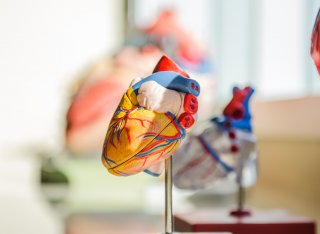
Prevention of ill health through innovation and behavioural change
Researchers in this topic are investigating a variety of topics such as chronic illness management, the role of dietary change and/or pharmaceutical intervention for metabolism/redox state to promote healthy ageing, promoting self-management of lifelong conditions and wearable sensors to improve healthcare. We have a wide range of collaborations in health and social care through business, academia and we welcome new partners.
Research projects

Continuous monitoring of vascular age by pulse wave velocity using wearable ECG and PPG sensors | Cardiovascular Medicine | Mathematics
Professor Philip Aston is a co-investigator in a project to develop low-cost methods to allow monitoring of individual 'vascular age' at scale during real life using wearables or design a prototype device with available components. In this first phase of the project, they will set up a developmental tool kit to integrate the data.

Frequent internet use by older people during lockdown linked to mental health benefits | Neuroscience
Researchers studied individual participants drawn from the English Longitudinal Study of Ageing in Summer 2020, whilst social distancing measures were in place. Participants were surveyed on the frequency and type of their internet usage... Those who reported using the internet frequently (once a day or more) had much lower levels of depression symptoms and reported higher quality of life compared to those who used the internet only once a week or less.

Effect of prebiotics of emotional well-being (2020-2023) | Cognitive Neuroscience
This 3-year project consists of three human intervention studies that will study the prebiotic effect of galacto-oligosaccharides on emotion regulation abilities at the behavioural and brain level in children, adolescents and young adults, complemented by gut microbiome profiling. The project is led by Dr Kathrin Cohen Kadosh, is conducted in collaboration with our industrial partner FrieslandCampina Ingredients, The Netherlands and the BUG group Surrey. Follow Kathrin on Twitter @kcohenkadosh

Investigating the effectiveness of Mindfulness-Based Cognitive Therapy (MBCT) for depressed non-responders to IAPT high-intensity therapies | Clinical Psychology
The aim of the research, led by Dr Thorsten Barnhofer, is to test whether Mindfulness-Based Cognitive Therapy (MBCT), a treatment using training in meditation to help people deal with negative mood, can reduce symptoms of depression in patients who previously received talking therapy, but did not improve. We would also like to see whether MBCT could be introduced at a reasonable cost

Developing and trialling the DAFNEplus (Dose Adjustment for Normal Eating) intervention. A lifelong approach to promote effective self-management in adults with type 1 diabetes | Health Psychology
Dr Debbie Cooke is a co-investigator on this £2.7 million programme, with collaborators in Sheffield. Behaviour change techniques, coupled with structured support and new technology (such as smartphones and apps) are used to help support adults in day-to-day management of their own conditions in the longer term.

Relationship between Facebook and perception of health | Health Psychology
Dr Bridget Dibb investigates issues concerning living with and managing chronic illness. She surveyed Facebook users to identify levels of comparison with others on the social networking site, self-esteem rates, perceived physical health and life satisfaction.

Health and social care research to improve patient care in Kent, Surrey and Sussex | Psychology
The Kent, Surrey and Sussex Applied Research Collaboration (ARCKSS) will bring together NHS Trusts, local authorities, universities, communities and other partners to support research to improve health and social care for patients and families in the south east. The collaboration, will be coordinated by Sussex Partnership NHS Foundation Trust with participation from University of Surrey colleagues, including Professor Monique Raats. @KSSAHSN

Textile-based non-invasive lithium drug monitoring: a proof-of-concept study for wearable sensing | Molecular Cardiovascular Sciences
One of the potential applications of wearable chemical sensors is therapeutic drug monitoring for drugs that have a narrow therapeutic range such as lithium. The project team, including, Dr Paola Campagnolo, are investigating the possibility of developing a fibre-based device for non-invasive lithium drug monitoring in interstitial fluid

Classification systems for processed foods | Food Science
Researchers from the University of Surrey, including Dr Terri Grassby, and the European Food Information Council (EUFIC) reviewed over 100 scientific papers to examine if different criteria exist in developing classification systems for processed foods and, if so, what distinguishes them.

InCluSilver - Personalised Nutrition for the Silver Economy | Biomedical Sciences
InCluSilver projects, supported by Professor Helen Griffiths, will: use knowledge of silver consumer behaviour to support the uptake of personalised nutrition by older adults; develop services and systems that define individual nutritional needs based on lifestyle, genotype, activity and health status; design and implement systems that enable monitoring of nutritional health status in older adults, amongst other projects.
Find out more
To join our Lifelong Health Network, share your research in this area or to find out more, please get in touch at lifelonghealth@surrey.ac.uk.






